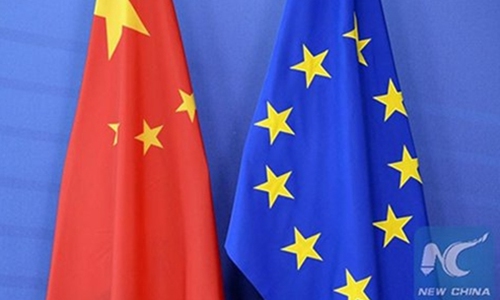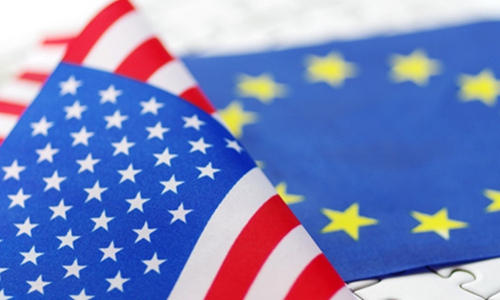
Photo: Xinhua
Shortly before a Monday talk with US State Secretary Mike Pompeo, European Union High Representative for Foreign Affairs Josep Borrell said the bloc won't ally with the US against China. Instead, Borrell called for a "big, positive agenda for EU-China cooperation" on Sunday.
The EU has taken a neutral position with US-China frictions. These tense matters range from the Washington-launched trade war against Beijing to the fight against the raging COVID-19 pandemic. Washington has been engaged in groundless accusations against Beijing and hoped to rope in its European allies in its hysterical smearing campaigns. From this perspective, the EU faces dilemmas of diplomacy under US pressure. But it has kept a clear head and rationality.
EU leaders, such as European Commission President Ursula von de Leyen and Borrell, as well as heads of major European countries, have been rational in treating China. Although they are not totally satisfied with China, they know it is useless to merely blame or sanction China if they really want to address the disputes with the latter. From the development of EU-China relations in the past decades, they have realized the importance of dialogues - the only real course of action to bridge differences. Therefore, the bloc has a clear and resolute stance regarding China - it doesn't take sides.
The EU makes its diplomatic policies under a normative framework, emphasizing multilateralism and negotiations. This is the basis for the EU's diplomacy. In other words, picking sides with the US goes against EU principles.
Furthermore, there is plenty room for EU-China cooperation in various spheres, These include jointly battling the novel coronavirus pandemic, which is a major public health emergency that cannot be addressed by any country alone. Europe's leaders clearly see the importance of cooperation with China and they have acted in line with this attitude.
The EU opposes some US moves internationally, such as the Trump administration's threat to pull from the World Health Organization (WHO). Meanwhile, it has been cooperating with China under WHO frameworks and also on other issues of common concern, like climate change.
The vast possibility of cooperation between the EU and China is one reason the bloc doesn't blindly follow the US' steps. In addition, due to the Trump administration's recklessness, the EU has felt resentment of the US. The bloc hasn't many countermeasures, but it can stay clear from US positions. And it can keep its diplomatic independency.
Borrell's remarks before his talks with Pompeo reflect that Europe won't bow to US pressure. Instead it will continue with its own way despite "all the challenges this brings."
In the past few weeks, Washington has been criticizing Brussels and it will continue pressuring the continent. China is likely to be an important topic in the talks between EU foreign ministers and their US counterpart. But the differences between the two sides are not likely to cause further deterioration with EU-US ties since in the long run the US doesn't want to reach a stalemate in its relationship with European countries - Washington still needs the Brussels in its campaign to contain China.
On the other hand, the talks won't fundamentally affect Europe's attitude toward China either. The continent needs to cooperate with China; therefore it won't budge in terms of its diplomatic rationality. The EU will keep its relations with both the US and China, but won't partially tilt toward any one or the other of the two.
This article was compiled by Global Times reporter Xu Hailin based on an interview with Shi Zhiqin, vice chairman of the Center for China-EU Relations at Tsinghua University. xuhailin@globaltimes.com.cn

